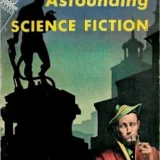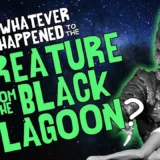Well. Things certainly have exploded since a certain awards ceremony at a certain science fiction convention in a certain Irish city, haven’t they?
Today, thoughts and feelings regarding Jeannette Ng’s win of the John W. Campbell (Fascist*) Best New Writer Award at the Dublin 2019 Worldcon.
In the immediate aftermath (well, actually during the…intermath?…there were claps and boos and shocked faces, mutterings into shoulders and beaming smiley faces) there was praise and there was condemnation.
There is still praise and condemnation.
There’s praise for Jeannette for having had the gumption to voice, publicly on SF’s biggest stage, what many have been saying since the 1960s – that the man who is credited with shaping modern science fiction was a fascist, whose beliefs stifled the full development of the genre by keeping non-whites out – and praise (at least from those who were really paying attention) to her linking of that kind of thinking with the terrible situation taking place in Hong Kong right now. (Ms. Ng is from Hong Kong but not living there now.)
There was condemnation for – her mistakes during the speech (naming Amazing Stories as the magazine he published for one**), her “obvious lack of knowledge about the genre”, her age, her gender; her very right to speak on the subject was questioned. One fan has even written that she should be gigged on a code of conduct violation for using the word ‘fucking’ during her speech. (Someone needs to read Joanna Russ’s book How to Suppress Women’s Writing, because they’ve not come up with anything new in that department since that book was written.)
Are some old timers never going to learn that those kinds of attacks – even if factually justified (not so in this case I believe) – are no longer appropriate, exacerbate the situation and draw ire down upon themselves? You do not have to have been a contemporary of John W. Campbell Jr. to comment on the the things he wrote and are quoted as having said.
So, was John Campbell a fascist? Even that is coming under debate because, apparently, some of the things he said weren’t strictly fascistic. We can turn to Nora Jemisin’s tweet for the resounding answer to that: “tl;dr John W. Campbell was a fucking fascist, @jeannette_ng was right, and the name of the awards should be changed. #FightFascismEveryDay”
The reasoning behind that statement is that repression is fascist in nature and Campbell repressed women, Jews and people of color by denying them access to his market.
Oh, but he published women and Jews and people of color….yes; after telling Judith Merril she couldn’t write SF (women can’t write SF) and rejecting everything she submitted beyond That Only A Mother (write more SF about mothers and babies); requested that Jewish authors change their Jewish sounding names and rejecting Delany’s novel because it featured a black protagonist.
One argument I want to address. The “there are some people who benefitted from Campbell who are very upset by this whole thing” crowd. I get it. You benefitted from his largesse, your career was positively influenced by him, you really believe that his impact on the field was important and the genre might not be what it is today without him. It hurts to have the character of someone you care about be brought into such high disregard.
What you need to realize is that we are now, finally, hearing from the people on the other side of that equation. The impact Campbell has had on them (is having on them) is still being felt today. “Women can’t write SF”. (I’m currently reading Mary Robinette Kowal’s The Calculating Stars. Women CAN TOO write SF.) Does it not bother you all to find yourselves on the same side of the divide as the puppies? This genre and this community is supposed to be a progressive, forward thinking, inclusive enterprise. We’re the people who are supposed to able to handle nuance, to base our thinking on fact and evidence, to be able to hold and evaluate opposing viewpoints and come to logical conclusions.
The logical conclusion is: Campbell shaped the genre – in his magazine – in a particular way, one that reflected his own beliefs and goals AND that he repressed the development of large segments of the field at the same time.
Another logical conclusion is that this uproar is unearthing – rather, re-surfacing – knowledge about Campbell that should lead to his removal from the pedestal he was placed on.
My own arguments for that are: his shaping of the genre was based on Gernsback’s initial formula, so, nothing unique there. He was able to do so because his magazine offered the best rates in the business and it is strongly arguable that any other competent editor could have done the same with those resources at their disposal. (Nick Mamatas wrote on Facebook: “You know, John W. Campbell’s big editorial intervention in science fiction was essentially just the basic function of an editor.” I agree.) And, if further proof is needed, by 1950, Campbell’s hand on the genre had become so stifling that a slew of new magazines were introduced that served to really widen its scope that forms the foundation of the genre as it is today – F&SF, Galaxy, If, Future, etc. (If anyone ought to be credited with “opening the field up to the mainstream”, go to Heinlein and his cracking the Saturday Evening Post AFTER he stopped writing for Campbell.)
Does anyone think that Heinlein, Asimov, Clarke, Sturgeon, et al would NOT have submitted to the highest paying market in the field (first) if someone else had been the editor? (Oh, but he shaped the fiction…Mamatas, Gernsback…)
I’d venture to say that the one editor – if we’re going to pick just one – who widened the field and actually established the roots of what it is today would have to be Frederik Pohl, not Campbell. Combine him with Wollheim’s work – both early and later in establishing markets and broadening exposure – and you are looking at something close to 80-% of those responsible.
We may only have this Campbell legacy owing to Campbell’s own desire to be a big man with an acknowledged impact on history – self-promotion in other words. A reading of Alec Nevala-Lee’s Astounding tome provides enough evidence for that contention.
To sum up, I think we owe Jeannette Ng a huge thank you for bringing this issue to the fore and making it acceptable to question the place our community reserves for Campbell; to ask if he really deserves the credits, accolades and reverence he is accorded. That discussion is going to continue – vociferously – for at least the near term, or, at least until his name is removed from the Best New Writer award (and maybe even from the other award named for him). There will be plenty who will defend him, largely those who believe that had it not been for him, they would not have a career. That may very well be true. This discussion, however, is not about individual careers, it is about an entire community, a community at this point that has grown to include those who Campbell would have denied, despite that denial. They’ve proven, at the highest difficulty setting, that they belong and what they are telling us is, rather than advancing the field, Campbell held its development in check.
* to quote directly “fucking fascist”. Based on his luncheon talk with Phillip Klass (Jews are homo superior); his suggestion to Judith Merrill that women can’t write SF, his rejection of black protagonists, his various editorials on the Watts riots, the Kent State shootings and more, one does not need ‘woke’ definitions of fascist to see that the word applies at least in a broad, if not specific sense
** Ms. Ng originally incorrectly named Amazing Stories as the magazine Campbell edited. We requested and received a correction on that score, have thanked Ms. Ng for making it and want everyone to know that we do not think that this is in any way the primary narrative of her speech; she had much more important things to say, made a slip during a high pressure situation, apologized for it and she and we have moved on. (We didn’t want the mistaken association to become persistent because Experimenter Publishing and Amazing Stories try to stay as far away from fascist leanings and thought as is humanly possible.)
For further reading on this subject, I suggest googling “John W. Campbell was a fascist”, “Jeannette Ng acceptance speech” as well as looking for a video James Gunn’s History of Science Fiction – which we understand will soon be made available again.
Steve Davidson is the publisher of Amazing Stories.
Steve has been a passionate fan of science fiction since the mid-60s, before he even knew what it was called.








You say “The reasoning behind that statement is that repression is fascist in nature and Campbell repressed women, Jews and people of color by denying them access to his market.”
The second part is true, but I don’t see the first part as a helpful definition. When all repression is defined as fascist, then either everything from the Soviet Union to Cao Cao to that boss who won’t let anyone get a word in during meetings is considered fascist, or worse, the idea that the Soviet Union, Cao Cao and that boss who won’t let anyone get a word in during meetings might have been repressive is dismissed because they obviously don’t fit some other, more intuitive definition of fascism that people have.
We don’t need to throw out the idea of fascism as a meaningful descriptor of a specific kind of bad political philosophy in order to argue that Campbell might have been fascist, and we probably should not, not least because “denied some group equal access to publication” is a very broad net. In contrast, what if we just consider what Wikipedia points out?
“Fascism is a far-right, authoritarian, ultranationalist political ideology and movement, characterized by a dictatorial leader, centralized autocracy, militarism, forcible suppression of opposition, belief in a natural social hierarchy, subordination of individual interests for the perceived good of the nation or race, and strong regimentation of society and the economy.”
Did Campbell believe in a natural social hierarchy? Yes; Michael Moorcock famously recalled attending a talk by Campbell where the latter argued in favor of the idea of “natural slaves,” including saying that Black people belonged to this category.
Was Campbell preoccupied with “the perceived good of the nation or race”? I would say, “yes,” because he was particularly concerned that humans be shown as superior to aliens, and that White people be shown as superior to Black people.
Did Campbell believe in strong regimentation of society and the economy? I would argue that, despite his like of “rugged frontiersmen” characters, he did: his approval of racial segregation is the strongest evidence here, as is his support of the idea of natural slavery and his believe in industrialization and division of labor as crucial to the well-being of society.
Did he like militarism and forcible suppression of opposition? Well, he approved of the Kent State shootings of student protesters against the Vietnam War. That seems, at the least, highly indicative.
Did he want a dictatorial leader and a centralized autocracy? I think this is the hardest point to argue. What’s clear is that he was fine with whole classes of people being excluded from government and with a somewhat technocratic view of who should govern, but I haven’t been able to find much evidence that he wanted a dictatorship. His worst political association was his support for George Wallace, who was extremely racist, but not an obvious authoritarian and would-be autocrat in the same way Donald Trump was. Chalk that up as a “maybe,” I suppose.
So I think a decent argument for John W. Campbell being fascist can be made on the basis of the actual defining characteristics of fascism as a political philosophy, only encountering a little bump on the important element of autocracy—though it would not surprise me if someone could find some solid evidence of autocratic beliefs on Campbell’s part. There’s no need to resort to equations of fascism to repression to defend such an argument.
There’re two kinds of *******: Actual ******* and pretentious ***-*******.
Which one is Jeannette Ng?
Robert, or whoever: have you stopped beating your wife?
That’s the kind of question you are asking. Seeing as how neither of your options apply to the author, I’ve blanked them out, but wanted you to know that we received your inappropriate comment, think that it is mean-spirited, inappropriate and based on a negative political agenda.
It has been my experience that great power and motivation (a necessity in any kind of serious endeavor, like writing, or running a sci fi mag, or inventing something…) invariably entails a few rough edges.
In general, I think that the article has reasonable conclusions. But I will disagree in this: “his shaping of the genre was based on Gernsback’s initial formula, so, nothing unique there ” No. For good or evil, Campbell changed the Genrsback’s formula in a fundamental way. Gernsback thought that SF was a way to teach science and technology to common people: “Not only do these amazing tales make tremendously interesting reading—they are also always instructive. They supply knowledge that we might not otherwise obtain—and they supply it in a very palatable form. For the best of these modern writers of scientifiction have the knack of imparting knowledge, and even inspiration, without once making us aware that we are being taught.” He said in his first editorial. Campbell was on the opposite side, he said: “No average mind can either understand or enjoy science fiction; it takes an amount of imagination beyond the average man. Too, it requires a type of mind that it realizes that it does not know all there is to know and has some curiosity about the unknown. It is the mind that already has an unusual stack of knowledge that is willing to admit there is more to know”, said in one of his first editorials So, for Gernsback, SF is an educational device, addressed to all people. For Campbell, it was just for the “intellectual elite”. No, there was something very “unique” in Campbell, and in the way, he shaped SF… as a ghetto, as an elite group, just for the “right” ones. As long as I know, that was not part of Gernsback’s formula and is an important change.
Rodrigo,
so, you are arguing that because Campbell thought that SF was not accessible to the general public, pandering to that concept in the stories he published was a good thing?
But I also disagree on your basis premis: Gernsback’s initial definition was “a charming romance intermingled with scientific fact and prophetic vision… Not only do these amazing tales make tremendously interesting reading—they are always instructive. They supply knowledge… in a very palatable form… ”
The man did not order those elements randomly, he placed them in order of importance: entertaining first (because otherwise you can’t tell the tale); based on science; speculation.
So, we have an editor who founded – at the very least – magazine science fiction – who thinks that the genre can and should be appealing in the hopes that it will not only entertain but instruct, versus an editor who thought the genre could only be read by certain (already educated) people and, therefore, the literature should be written to appeal to that very small minority.
Hmmmm.
Gernsback was oriented to the fiction the way that fandom would come to be – open and inclusive. Here’s some entertaining fare that you might learn something from. He created the SFL in order to encourage the popularity of the genre; his door was open. Campbell, based on those editorials and letters you are referencing, was saying “special group, don’t come in”.
IF you have a desire to really compare and contrast, I heartily and strongly recommend Gary Westfah’s The Mechanics of Wonder: The Creation of the Idea in Science Fiction, which goes into far more detail in demonstrating that Campbell only modified what Gernsback had laid on the table, as have all editors since, rendering it nothing special, just, more of the same.
First, you said: ” you are arguing that because Campbell thought that SF was not accessible to the general public, pandering to that concept in the stories he published was a good thing?” I only could conclude that you missed the very first words of my comment: “In general, I think that the article has reasonable conclusions.” There is no point to debate on things that we have a similar opinion, I would debate things that we think differently.
Second, you said “So, we have an editor who founded – at the very least – magazine science fiction – who thinks that the genre can and should be appealing in the hopes that it will not only entertain but instruct, versus an editor who thought the genre could only be read by certain (already educated) people and, therefore, the literature should be written to appeal to that very small minority.” And really, is the very same thing that I am saying. So, what is your point here?
Third, doctor Westfahl is my main source also. Although, of course, in an interpretative way. It was reading Westfah that by the very first time I was aware of the different views between Gernsback and Campbell.
And again, being opposed to one of your affirmations doesn´t mean that I oppose all your entire yhoughts. And I said that, explicitly.
ok, sorry, I guess I must have misread what you were saying; I’ll go back over it when I have a bit more time.
Also, I’ll go back to Westfahl (again, when I get a chance) and perhaps offer a bit of detail on why I interpret things he wrote the way I do.
A much needed commentary, Steve. I was a fan of Analog and Campbell’s, sometimes, outstanding editorials, but have found over the years that many of our idols have muddy clay feet. To not acknowledge that would be the greater sin. Sure, he helped some writers and the world was different then but to ignore those characteristics and behaviors that were not as honorable would be burying our heads in the sand.